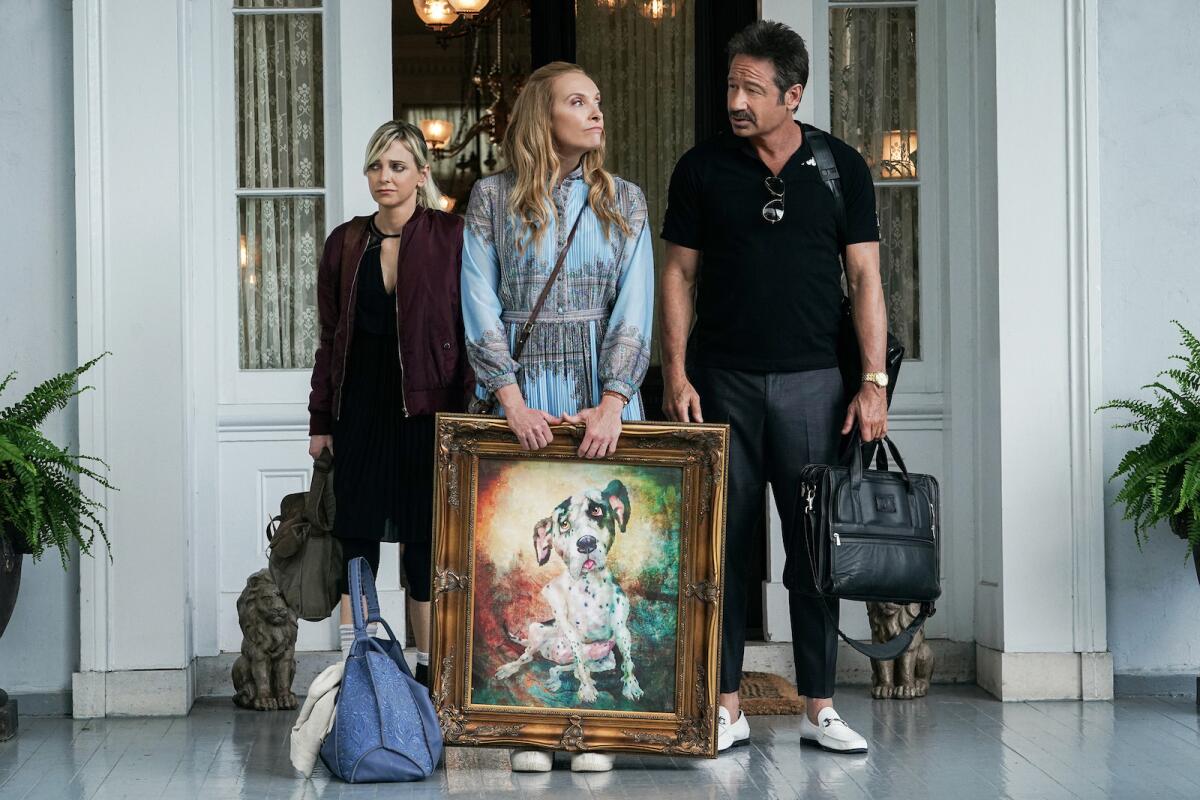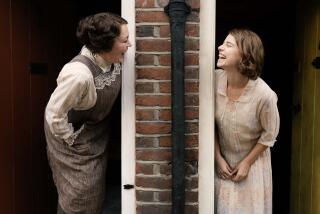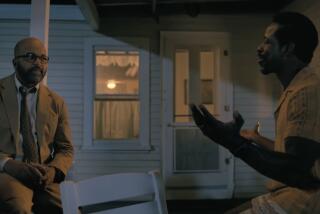Review: More bleak comedy than black, ‘The Estate’ is not worth your time (or Toni Collette’s)

Watching the ensemble black comedy “The Estate,” written and directed by Dean Craig and co-starring Toni Collette, will no doubt draw comparison to another ensemble black comedy co-starring Toni Collette, “Knives Out,” which dwells in the same milieu of money-hungry family members competing for a mention in a wealthy family member’s will. Of course, “Knives Out” is a twisty whodunit in the vein of Agatha Christie, and Craig’s film is merely an exploration of what depravities people might sink to in hopes of getting a bigger piece of the financial pie. Still, there are enough similarities between the two films, both rife with smarmy, unlikable characters, that one could become preoccupied in wondering why “Knives Out” works and why “The Estate” decidedly does not.
The answer lies in what “The Estate” is lacking, which is someone to root for. There might be some actual stakes in the game if we wanted someone, anyone, to win the inheritance that’s up for grabs when it’s announced that the wealthy and childless Aunt Hilda (Kathleen Turner) does not have long for this world.
For your safety
The Times is committed to reviewing theatrical film releases during the COVID-19 pandemic. Because moviegoing carries risks during this time, we remind readers to follow health and safety guidelines as outlined by the CDC and local health officials.
One would think that Collette’s character, Macey, with whom’s perspective we are aligned throughout, would be the hero of this film, but it’s a challenge to identify with her passive-aggressive people-pleasing, her character defined only through her relationship to men (her dead father, her ex-husband, her current boyfriend, her creepy cousin).
Craig has crammed the only character exposition and motivation into a truly appalling animated opening-credits sequence set to a jazzy blues tune. We see the animated stick-figure avatars of Macey and her sister, Savanna (Anna Faris), working in a cafe left to them by their late father, and a foreclosure notice from the bank. As we transition out of this animated sequence, the sisters are denied a loan, and they discover Aunt Hilda is dying; Savanna convinces a reluctant Macey to pay a visit to try and get into Hilda’s will. Presumably it’s to save the cafe that we never see again nor care about, until Macey changes her mind halfway through the film and declares she wants the money so her boyfriend, Geoff (Gichi Gamba), won’t move to Alaska.
When they find their cousin Beatrice (Rosemarie DeWitt) and her husband, James (Ron Livingston), already ensconced in Hilda’s New Orleans mansion, with another cousin, the lecherous Richard (David Duchovny), pulling up outside in his Porsche, it’s war. Scatological mishaps and sex crimes (yes, sex crimes) ensue as the cousins fight to be Hilda’s favorite.
It turns out that Beatrice and James want the money for their struggling restaurant (that’s two failing restaurants), and Richard, who prefers Dick, just wants a new Porsche. Though Richard has a strange cousin fetish for Macey, his forthright manner and Duchovny’s relaxed delivery make him the only funny character in the film, and quite possibly the only cousin worth rooting for.
It’s just too hard to hang with Macey when she meekly goes along with Savanna’s harebrained schemes that result in criminal behavior, such as kidnapping and sexual assault; Savanna is so off-the-rails her behavior only makes sense if she was in the throes of a psychotic break, and Faris’ tired comedic schtick doesn’t help dissuade us otherwise.
Watching “The Estate” feels like being gaslit as we attempt to understand the purpose of anyone’s actions, or find any humor in these morbidly bleak antics, when there is simply nothing there. It’s not funny, it’s not satirical, and it’s not worth your time, or Toni Collette’s. Hopefully it was a nice trip to New Orleans.
Katie Walsh is a Tribune News Service film critic.
‘The Estate’
Rated: R, for pervasive language, crude/sexual material, graphic nudity and brief drug use
Running time: 1 hour, 36 minutes
Playing: Starts Nov. 4 in general release
More to Read
Only good movies
Get the Indie Focus newsletter, Mark Olsen's weekly guide to the world of cinema.
You may occasionally receive promotional content from the Los Angeles Times.










